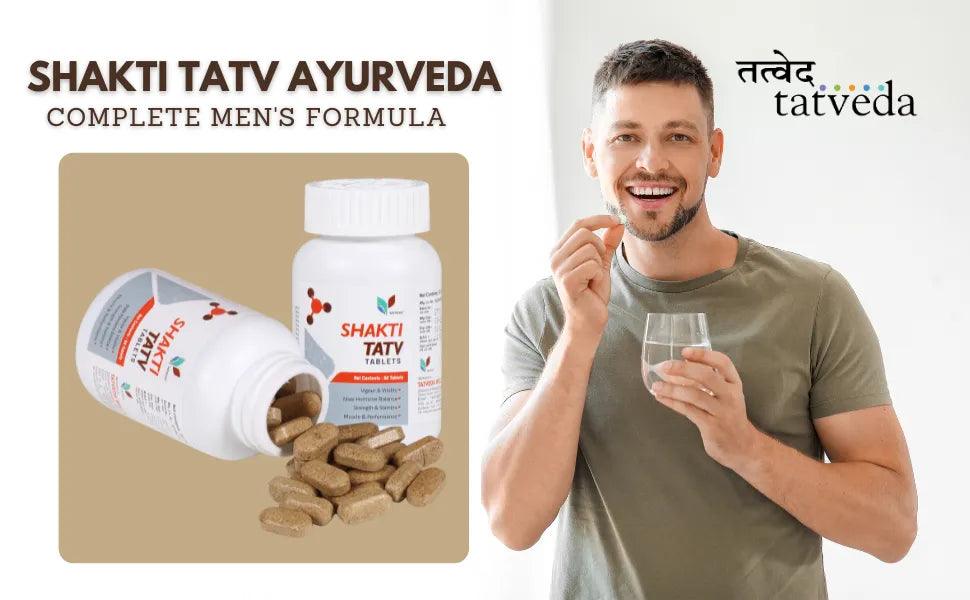
Ayurveda for Men | Natural Ayurvedic Herbs to Support Strength, Stamina, Health and Wellness.
Share
Ayurveda is an ancient Indian system of medicine that emphasizes natural healing and prevention of diseases, maintaining a delicate balance between the mind, body, and spirit. Ayurveda offers a natural and holistic approach to health, using herbs and other natural remedies to support strength,stamina, vigor, vitality, restore balance and harmony in the body. Ayurvedic herbs have been used for years to promote men's health and wellness to improve their strength, stamina, and sexual health.
Some of the most effective Ayurvedic herbs for men and scientific references supporting their use are discussed in this article. These include Kauch beej (Mucuna pruriens), Ashwagandha (Withania somnifera), Shilajit (Asphaltum punjabianum), Shatavari (Asparagus racemosus), Kali musli (Curculio orchioides), Haritaki (Terminalia chebula), Safed musli (Asparagus adscendens), Akarkara (Anacyclus pyrethrum), Javitri (Myristica fragrans), Yasad bhasma (Zinc), Kesar (Crocus sativus), and Suvarna bhasma (Gold).
Scientifically, Kauch beej (Mucuna pruriens) has been shown to improve sperm count and motility. Ashwagandha (Withania somnifera) helps reduce stress and improve sexual function. While Shilajit (Asphaltum punjabianum) is mineral-rich and believed to improve energy levels and sexual function. Similarly, Shatavari (Asparagus racemosus) is known for its ability to balance hormones and improve sexual function.
Kali musli (Curculio orchioides) helps to improve sexual function and increase sperm count. While Haritaki (Terminalia chebula) is known for its anti-aging properties and ability to improve digestion. Additionally, Safed musli (Asparagus adscendens) is believed to improve sexual function and boost testosterone levels.
Akarkara (Anacyclus pyrethrum) is believed to improve sexual function and boost testosterone levels. Javitri (Myristica fragrans) is known for its aphrodisiac properties and ability to improve sexual function. Yasad bhasma (Zinc as zinc oxide) is essential for the production of testosterone and is believed to improve sexual function.
Kesar (Crocus sativus) is believed to improve sexual function and reduce erectile dysfunction. Suvarna bhasma (Gold as auric oxide) is a miracle drug in Ayurveda believed to improve vitality and sexual function.
Overall, Ayurvedic herbs may be a valuable addition to a healthy lifestyle for men looking to support their overall health and wellness. Ayurvedic herbs can be a safe and effective way to improve strength, stamina, sexual health, and wellness in men. References have been provided to support the potential benefits of these herbs.
"It is essential to consult a qualified healthcare provider before using herbs, herbal remedies, or supplements. It's even more important in the presence of an underlying medical condition or prescription medications," Says Dr. H S Chauhan, Dermatologist, Twacha Dermatology Clinics India.
Ayurvedic blend of herbs like Kauch beej, Ashwagandha, Shilajit, Shatavari, Kali musli, Haritaki, Safed musli, Akarkara, Javitri,Yasad bhasma in Shakti Tatv by Tatveda may improve quality of life in men
References:
- Ahmad, M. K., Mahdi, A. A., Shukla, K. K., Islam, N., Jaiswar, S. P., Ahmad, S., & Shankhwar, S. N. (2009). Effect of Mucuna pruriens on hormonal status and semen quality in infertile males. Contraception, 78(2), 194-199.
- Ambiye VR, Langade D, Dongre S, Aptikar P, Kulkarni M, Dongre A. Clinical Evaluation of the Spermatogenic Activity of the Root Extract of Ashwagandha (Withania somnifera) in Oligospermic Males: A Pilot Study. Evid Based Complement Alternat Med. 2013;2013:571420.
- Biswas, T. K., Pandit, S., Mondal, S., Biswas, S. K., Jana, U., Ghosh, T., & Tripathi, P. C. (2011). Clinical evaluation of the spermatogenic activity of processed Shilajit in oligospermia. Andrologia, 43(5), 339-348.
- Exton, M. S. (1997). Phytoestrogens in the treatment of prostate cancer. Annals of the New York Academy of Sciences, 836(1), 226-239.
- Gogte, V. M., & Prabhakar, J. V. (2010). Suvarna bhasma (gold bhasma): a miracle drug in Ayurveda. Ancient Science of Life, 29(1), 1-5.
- Hosseinzadeh, H., & Nassiri-Asl, M. (2013). Avicenna's (Ibn Sina) the Canon of Medicine and saffron (Crocus sativus): a review. Phytotherapy Research, 27(4), 475-483.
- Joshi, S. G., & Parikh, J. R. (2006). Terminalia chebula (G.) Retz. (Combretaceae): a review of its ethnobotany, pharmacology, and phytochemistry. Fitoterapia, 77(3), 201-212.
- Kaur, K., & Arora, S. (2013). Shatavari (Asparagus racemosus): a review. International Journal of Pharmaceutical Sciences and Research, 4(7), 2491-2496.
- Kotta, S., Ansari, S. H., & Ali, J. (2013). Exploring scientifically proven herbal aphrodisiacs. Pharmacognosy Reviews, 7(13), 1-10.
- Prasad, A. S. (2013). Zinc is an antioxidant and anti-inflammatory agent: Its role in human health. Frontiers in Nutrition, 1, 14.
- Rajkumar, A., & Chen, Y. (2017). Role of Myristica fragrans in the management of male reproductive health. Asian Journal of Andrology, 19(3), 328-335.
Disclaimer:
The content of this article is for educational and awareness purposes only. It is not intended to diagnose treat of cure any medical condition or suggest any treatment.




